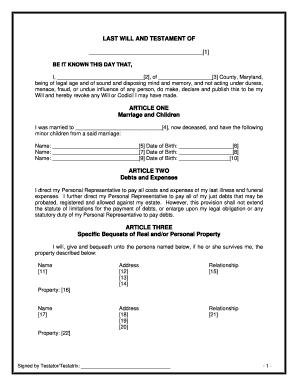An estate planning is what everyone should take into consideration while they are alive. One important thing you should always know is that without a legally defined plan in place, you’re definitely leaving your entire legacy in the hands of the courts. This might cause your families and loved ones a lot. Therefore to ensure your assets are distributed according to your wishes, testamentary trust or last will can be a better option. This article is the best and complete guide providing you with some illustrative examples, taxation as well as how will with a testamentary trust work.
Definition
A testamentary trust also known as “last will” is a provision in a will that appoints a trustee to manage the assets of the deceased. It becomes effective after the grantor’s death. However, It is also created in accordance with the instructions in a person’s Last Will and Testament. They outlines when assets will be given to certain beneficiaries upon a certain age, graduate, as it is in the will.
A Testamentary Trust is irrevocable, thus it cannot be revoke after a certain period of time. This is because a testamentary trust goes into effect after a person demise. Another important thing is that it does not avoid probate because the court will typically determine the trusts authenticity and supervise the distribution of assets. Moreover, if the trustee does not elects a beneficiary, no person has a vested interest in the assets of the trust.
Read Also: REVOCABLE TRUST: What is Living Revocable Trust?
In addition, the Testamentary must have three most important parties:
#1. A Grantor
This is an individual or a person who creates the trust, appoints the trustee to manage the assets before they are finally given to the beneficiary.
#2. A trustee
A Trustee is a custodian for the assets within a Trust. They are soley responsible for managing and administering the finances of a Trust upon instructions given. Before appointing a Trustee, it’s important to find someone who will forgo all personal goals and follow the trust instructions.
#3. The beneficiary
A beneficiary is someone who gains an advantage and/or profits from something. In the context of the article they are persons or entity you name in a life insurance policy to receive the death benefit.
Types of Testamentary Trust
#1. Separate Trust
Separate trusts in simple term is actually the creation of a specific Trust for each beneficiary. In many cases, this means making separate trusts for each child that equally split one’s assets. This kind of trusts are usually distributed individually.
#2. Family Testamentary Trust
This kind of testamentary trusts allow parents to distribute assets according to a child’s needs. Parents who want to leave more funds to a particular child with either special needs or with an additional financial support mostly use this kind of trust.
Testamentary Trust Taxation
Trusts are a important element in Estate Planning because help provide more control over asset distribution after the grantor’s death. Testamentary trust can be one of the best to opt for. Reducing tax in estate planning is a worthwhile process. The greatest advantage of using a testamentary trust is that income, capital gains, and dividends are yearly distributed amongst beneficiaries in a tax-efficient way. However, this tax vary from state to state. Testamentary trust taxation depends on the state you live in. However, there could be capital gains tax on assets for the trust by the trustee after your death.
Will with Testamentary Trust
To create a testamentary trust in a will, the settlor must designate a trustee and specify all beneficiaries. As earlier stated, this trust comes into effect when the settlor dies. Therefore, the testamentary trust must be in the settlor’s “last will”, There after, the probate process will take place.
It is pertinent to understand that while other types of trusts may avoid probate, it is ideal for a will with a testamentary trust to go through the probate process. This is only what completes the testamentary process before it can be effective.
Distributions of assets in a will with a testamentary trust can only be given out after all reviews of provisions by all parties. The trustee may also go to the probate court at least once a year and ensure the court that the trust is being taken care of in line with the will and state law.
Testamentary Trust Example

The following illustration gives you a clear cases example of testamentary trust.
Firstly, If you want your 5-year-old daughter or son to receive your assets after you die.
When you choose someone special as the trustee of your testamentary trust.
When You specify a certain person that will manage your assets for your daughter’s benefit until she reaches the age of 25.
If You specifically mention someone to be in charge of giving your child monthly income for education and other expenses.
Lastly, stating the specific age your daughter will be, before receiving the remaining assets, and the trust will terminate.
Related Articles:
- LIVING TRUST: Overview, Cost, Templates, Pros & Cons (+Writing Guide)
- LIVING TRUST VS WILL: Best option in the US (+Major differences)
- SUCCESSOR TRUSTEE(Opens in a new browser tab)
- Grantors Trust: A Simple definitive guide (Updated!
In summary, a testamentary trust is a provision in a will that appoints a trustee to manage the assets of the deceased. It is often used when the beneficiary or beneficiaries are children or in a critical condition such as disabilities. The trust is also used to reduce estate tax liabilities and ensure professional management of assets. Therefore it is important to seek the help of an experienced estate lawyer before creating a testamentary trust. All information contained in this article are for informational purpose. We do not recommend you to opt for any.






